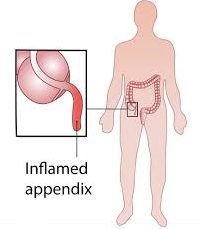CALL TODAY 646-846-1136 | EMAIL
Appendix Surgery – What to Expect
 The exact purpose of the appendix is relatively unknown even to modern science. Some experts believe it to be a sort of “home” for healthy bacteria that can be used to fight off dangerous invading cells. Other believe that the appendix does nothing, that it is simply a mass that no longer has a physical function in our daily lives. Regardless of what the appendix is truly intended for, at times it can be inflamed and may require surgical removal.
The exact purpose of the appendix is relatively unknown even to modern science. Some experts believe it to be a sort of “home” for healthy bacteria that can be used to fight off dangerous invading cells. Other believe that the appendix does nothing, that it is simply a mass that no longer has a physical function in our daily lives. Regardless of what the appendix is truly intended for, at times it can be inflamed and may require surgical removal.
Why Would you Need Appendix Surgery?
As mentioned above, we are still a little unclear on many aspects of the functions of the appendix. In other organs, it can be clear that the organ needs to be removed when it fails to function properly. This observation cannot be made effectively for the appendix. However, there are a few specific cases in which it is clear that the removal of the appendix would be beneficial. One common case is appendicitis, or inflammation of the appendix. Although we don’t know exactly what causes appendicitis, this inflammation is clear evidence of a potential issue in the body. It is usually a company by discomfort or pain and the lower right quadrant of the abdominal cavity. Other signs of appendicitis include stomach pain, vomiting, and nausea.
Yet another reason that the appendix may need to be removed is in cases of tumor growth. Should a tumor grow on the appendix and be cancerous, it could potentially metastasize, or spread, to other parts of the body. Studies have shown little to no danger or long-term deficits associated with removal of the appendix. Therefore, it is typically preferred to remove the appendix when there is a risk of cancer. This can serve to protect the rest of the body.
What Happens Before Appendix Surgery?
Prior to appendix surgery, you will have a long discussion with your doctor about your specific case. For example, we will want to know what symptoms you have been having, if you have a family history of any number of ailments, the current medications you are taking, and more. your personal preference with regard to surgical procedures and desired outcomes must also be discussed.
Many specific diagnostic tests can be completed to ensure that the appendix is the culprit. For example, CT scans and ultrasound measures can be used to determine swelling and inflammation of the appendix, a sure sign of infection. On the day of the surgery, it will be important to avoid eating or drinking prior to the surgery. It is generally recommended that eating and drinking be done more than 8 hours prior to the surgery, but your surgeon will have more specific instructions for you. During the surgery itself, we will do what we do best and remove the inflamed or damaged tissue.
What is Appendix Surgery Recovery Like?
After the surgery, you will most likely first notice relief from the pain where your appendix used to be. However, it is still common for some incision and surgical site pain shortly after surgery. This discomfort will subside. While healing from appendix surgery, it will be important to get plenty of rest while still staying active. Although your surgeon will have specific instructions, there are a few that are typically followed. Avoid heavy lifting for at least a few weeks following your surgery. Any kind of strenuous activity that puts pressure or strain on the incision site is to be avoided.
Depending on the precise surgical procedure you undergo, your recovery may take anywhere from 2 weeks to a few months. Due to the fact that the exact function of the appendix is relatively unknown, diet and lifestyle changes typically are not needed.
Do you need to have your appendix removed? Schedule an appointment with the best surgeons in NYC to discuss your needs today.
LENOX HILL MINIMALLY INVASIVE SURGERY
117 E 77th Street
Suite 1A
New York, NY 10075
646-846-1136
admin@lenoxmis.com
——–
References
https://www.sages.org/publications/patient-information/patient-information-for-laparoscopic-appendectomy-from-sages/
https://www.medicinenet.com/appendectomy/article.htm
https://myhealth.alberta.ca/Health/aftercareinformation/pages/conditions.aspx?hwid=ug3573
https://www.webmd.com/digestive-disorders/digestive-diseases-appendicitis#1

